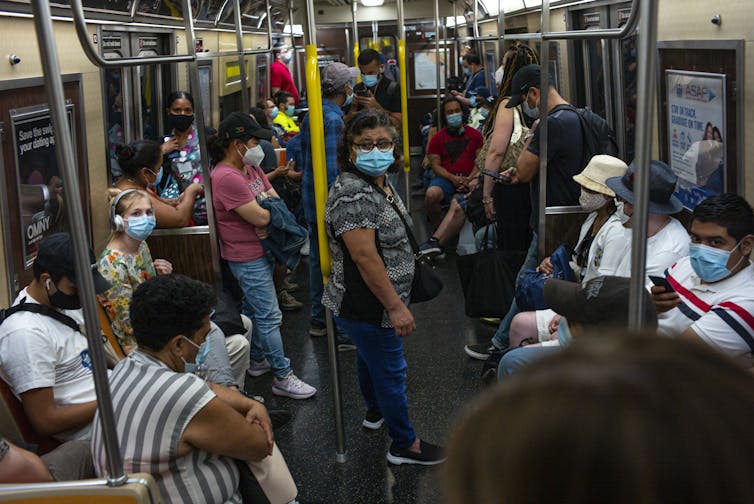Our analysis of 7 months of polling data shows friendships, the economy and firsthand experience shaped and reshaped views on COVID-19 risks
- Written by Wanyun Shao, Assistant Professor of Geography, University of Alabama
Even though Americans shared the experience of living through a global pandemic, their individual attitudes towards it differed and evolved – sometimes dramatically.
We study[1] risk perception. Using public opinion polls and state-level data, we conducted an in-depth analysis of how American attitudes and behaviors changed over the course of the pandemic.
Since the first confirmed COVID-19 case in the U.S., over 33 million Americans have been diagnosed with SARS-CoV-2 and more than 600,000 have died[2]. We set out to see how attitudes and beliefs correlated with Americans’ risk perceptions, mask wearing and support for other COVID-19 mitigation measures.
Here’s what we discovered.
Public health and politics are intertwined
Using statistical modeling, we dug into data from public opinion polls conducted by Pew Research Center, National Opinion Research Center, Democracy Fund and UCLA – as well as our own survey combined with state-level data from the Centers for Disease Control and Prevention and Moody’s Analytics and National Conference of State Legislatures.
In a presidential election year characterized by intensifying polarization[3], public health got caught up in politics.
In March 2020, with uncertainty surrounding COVID-19, contrasting cues from political leaders undoubtedly played a crucial role in shaping risk perception of the virus.
Conservatives who had more confidence in President Trump and his team’s handling of COVID-19, perceived less risk from the virus[4] compared to conservatives with less confidence in Trump.
 Political leaders shaped risk perception.
Chip Somodevilla via Getty Images News[5]
Political leaders shaped risk perception.
Chip Somodevilla via Getty Images News[5]
The powerful influence of political cues persisted. Based on our analysis of a poll conducted in June 2020[6], Republicans who were in favor of Trump were less supportive of mitigation measures – like canceling gatherings, closing businesses and schools, restricting non-essential travel and fever testing before entering public buildings – compared to Republicans who were less supportive of Trump[7].
Symmetrically, Democrats who were in favor of then candidate Joe Biden were more supportive of mitigation measures, compared to Democrats who were less supportive of Biden[8].
By May 2020, national political influence began to be mirrored at the state level. Americans who lived in states with both Democratic governors and legislatures were more likely to perceive COVID-19 as a threat[9] and adjust their behaviors and support policy measures to mitigate transmission of the virus.
Connected communities more likely to slow the spread
When the pandemic was rapidly spreading in early summer of 2020, the CDC recommended wearing masks[10]. Americans with more extensive social connections and stronger trust in others were more likely to engage in mitigation behaviors[11] such as mask wearing.
Individual behavior is influenced by one’s community[12] – such as family, friends and neighbors. As information on the pandemic spread, counties where residents had stronger and closer connections with others started to show a slower increase in COVID-19 cases[13], as people adopted more infection mitigation measures.
 People in areas with greater social connection were more likely to change their behaviors.
Robert Nickelsberg via Getty Images News[14]
People in areas with greater social connection were more likely to change their behaviors.
Robert Nickelsberg via Getty Images News[14]
Also, people with stronger and closer connections with others were more likely to act for the common good[15] with the expectation that others would do the same. Trust promoted social coordination, which provided incentive for people to take similar actions such as wearing masks in response to COVID–19.
COVID-19 survivors less likely to support distancing
In summer 2020, when COVID-19 continued to infect thousands of Americans a day, the CDC recommended mitigation measures[16] such as canceling gatherings, closing schools and restricting non-essential travel.
Americans who contracted COVID-19 – or whose family members had been sick with the coronavirus – didn’t necessarily support mitigation measures[17] after their illness. Perhaps acquiring some measure of immunity by surviving COVID-19 lessened their perceived threat. As philosopher Friedrich Nietzsche once said, “What does not kill me makes me stronger[18].”
Interestingly, Americans who had coworkers and others in their social circle get COVID-19 were more likely than others to support mitigation measures[19]. It may be those with indirect experience became more anxious about contracting the virus themselves by hearing “horror stories” from others.
Economic recovery falsely signaled safety
In late August to early September 2020, Americans from states whose economies had recovered close to pre-pandemic levels became less concerned about the pandemic[20] and were more likely to forgo mitigation behaviors. We suspect economic recovery provided people with the impression that a return to normal was around the corner, which helped form a false sense of safety.
Risk mitigation closely linked to cases and deaths
COVID-19 case numbers and death rates influenced whether or not people adopted risk mitigation behaviors. Generally speaking, more cases[21] and deaths[22] influenced people to see the virus as a more urgent threat, which resulted in active mitigation behaviors.
Meanwhile, in places with a low number of confirmed cases or deaths, residents were likely to perceive the risk as abstract and distant[23]. Consequently, their motivation to control the transmission of the virus was weak.
Overall, our research shows the combination of timely information with trusting, well-connected communities, is most likely to result in collective risk mitigation behavior. Perhaps these insights can help the U.S. prepare better for the next pandemic.
[Research into coronavirus and other news from science Subscribe to The Conversation’s new science newsletter[24].]
References
- ^ study (scholar.google.com)
- ^ more than 600,000 have died (coronavirus.jhu.edu)
- ^ characterized by intensifying polarization (www.pewresearch.org)
- ^ perceived less risk from the virus (doi.org)
- ^ Chip Somodevilla via Getty Images News (www.gettyimages.com)
- ^ analysis of a poll conducted in June 2020 (www.voterstudygroup.org)
- ^ compared to Republicans who were less supportive of Trump (doi.org)
- ^ compared to Democrats who were less supportive of Biden (doi.org)
- ^ more likely to perceive COVID-19 as a threat (doi.org)
- ^ recommended wearing masks (www.cdc.gov)
- ^ more likely to engage in mitigation behaviors (doi.org)
- ^ influenced by one’s community (doi.org)
- ^ slower increase in COVID-19 cases (doi.org)
- ^ Robert Nickelsberg via Getty Images News (www.gettyimages.com)
- ^ more likely to act for the common good (doi.org)
- ^ CDC recommended mitigation measures (www.cdc.gov)
- ^ didn’t necessarily support mitigation measures (doi.org)
- ^ What does not kill me makes me stronger (en.wikipedia.org)
- ^ more likely than others to support mitigation measures (doi.org)
- ^ became less concerned about the pandemic (doi.org)
- ^ more cases (doi.org)
- ^ deaths (doi.org)
- ^ residents were likely to perceive the risk as abstract and distant (doi.org)
- ^ Subscribe to The Conversation’s new science newsletter (theconversation.com)

















